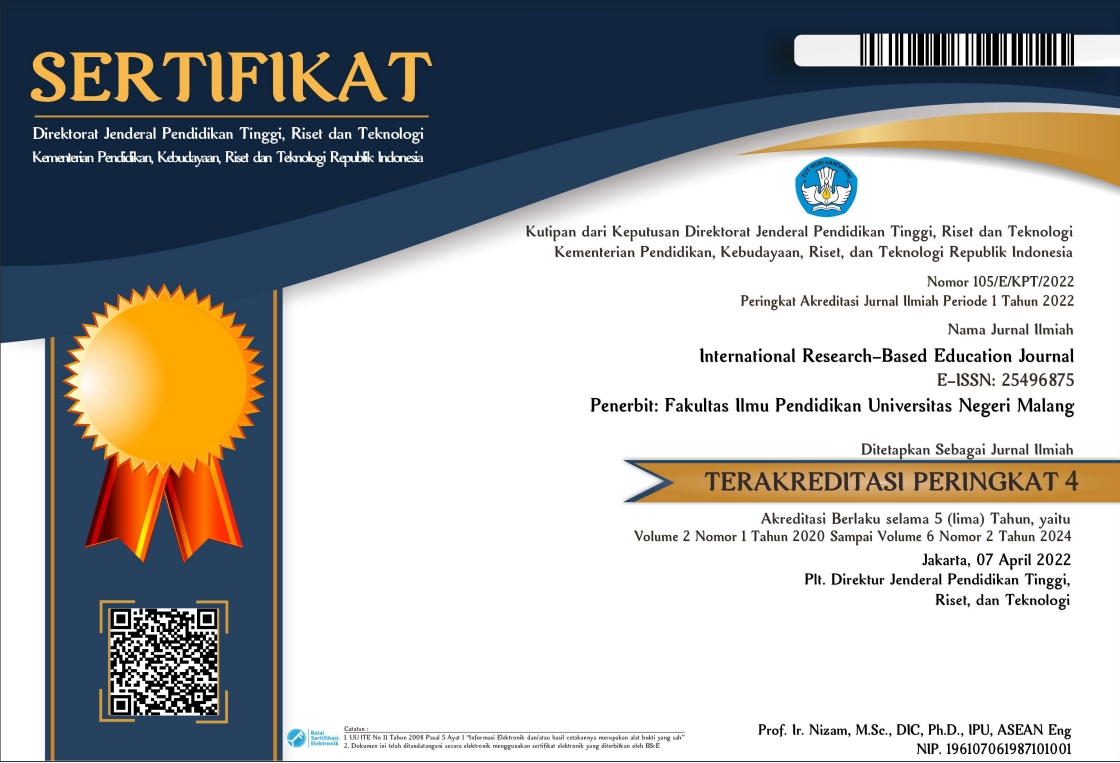THE INTERNALIZATION OF SPIRITUAL BASED CHARACTERS VALUE IN BUILDING THE CULTURE OF EDUCATION ORGANIZATION
Abstract
This study describes characters' value integration in developing an organizational culture in education which has got various significance changes in all aspect. This obviously can be seen from the lecturers' professionalism programs, students' output as well as the ongoing physical development. This is a qualitative research involving a case study design. The data was collected through observation, documentation, and deep interview techniques, and then analyzed through (1) data reduction, (2) data presentation, and (3) conclusion. From data analyzed, shows that the integration of characters based on Islamic values in constructing organization culture in STAI shows more effective impact. The values involve (1) love, (2) sincerity, (3) patient, (4) professional activities, (5) God's Blessing, and (6) The awareness of previous histories.
Keywords: spiritual based characters values; organizational culture
Keywords
Full Text:
PDFReferences
Anthony, RN. dan Darden, John. 1993, Sistem Pengendalian Manajemen, yang dialih bahasakan oleh Ir. Agus Maulana, Binapura Aksara.
Bogdan, R.C & Biklen, S.K.B. 1998. Qualitative Research for Education to Theory and Methods. Allyn and Bacon, inc. Boston.
Denison, D, 2000. Organizational culture: Can it be a key lever for driving organizational change?" in S. Cartwright and C. Cooper. (Eds.) The Handbook of Organizational Culture. London: John Wiley & Sons.
Eisenberg, N. 1986. Altruistic Emotion, Cognition, and Behavior. Hillsdale, NJ: Erlbaum.
Nasution, H., 1998. Islam Rasional, Bandung: Mizan
Koentjaraningrat, 1989a, Kebudayaan, Mentalitas, dan Pengembangan, Jakarta: Gramedia
Kohlberg, L. 1984. The Psychology of Moral Development. San Francisco, CA: Harper & Row.
Kotter and Heskett , 1992, Peranan Budaya Terhadap Kinerja Dalam Perusahaan (Corporate Culture And Performance).
Lickona, T. (1991). Educating for Character. How Our Schools Can Teach Respect and Responsibility. NY: Bantam Doubleday.
Milles, BM & Huberman, A.M. 1992. Analisis Kualitatif. Penerjemah Rohadi. Jakarta: RT Universitas Indonesia
Mochyi, A,2013, Teori dan Perilaku Organisasi, Malang: UMM Press.
Muhadjir. N., 2000, Metodologi Penelitian Kualitatif, Bandung: Remaja Rosdakarya.
Mulkan, A. M., 2002. Agama dan Negara. Yogyakarta : Pustaka Pelajar
Moeljono, D., 2003. Budaya Korporat dan Keunggulan Korporasi, ElexMedia Komputindo, Jakarta
Narver & Slater, 1990, “ Market Orientation and the Learning Organization”, Journal Marketing, Vol 59. NO. 3 Narver & Slater (1990)
Owens, R. G., 1991, Organizational Behavior in Education, Thir edition New Englewood Cliffs: Prentice-Hall, Inc.
Piaget, J.,1967, The Moral Development of the Child. New York: Collier.
Poespoprodjo. 1999. Filsafat Moral. Bandung: Pustaka Grafika
Robbins, S. P., 2002, Perilaku Organisasi Konsep Kontroversi Aplikasi, Jilid 2. Jakarta: Prenhallindo.
Suwarno. 2005. Pengantar Umum Pendidikan. Surabaya: Aksara Baru
Thoha, M (2001). Prilaku Organisasi, Jakarta. PT. Raja Grafindo Persada
Wijanarko, H., 2006, Slogan (online), http://ww, Jakarta consulting.com/art-01-45.htm the Jakarta Consulting Group Partner In The Jakarta Consulting Group All Right Reserved, diakses tgl 26 Agustus 2011.
Wisnu UR, Dicky dan Nurhasanah, S., 2005, Teori Organisasi Struktur dan Desain, Malang: UMM Press.
Yin, Robert, K. 2011. Studi Kasus Desain dan Metode. PT Raja Grafindo Persada. Jakarta.
DOI: http://dx.doi.org/10.17977/um043v1i1p%25p
Refbacks
- There are currently no refbacks.

This work is licensed under a Creative Commons Attribution-NonCommercial-ShareAlike 4.0 International License.










1.png)



